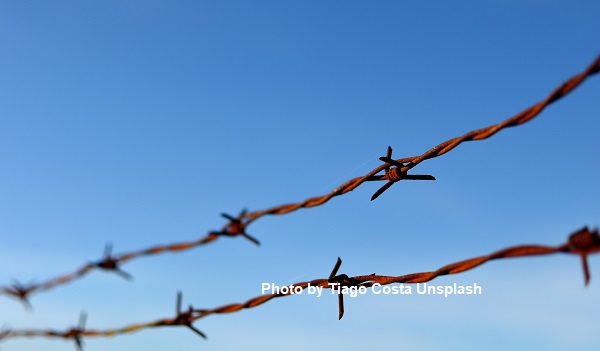Poland has deployed 20,000 border guards and soldiers at the border with Belarus, where large groups of people on the move have amassed. The European response has been “security-focused and politically charged”, with the UN accusing EU states of failing to treat the human rights of people at the border as the primary concern. Polish residents meanwhile have taken to handing out food and water as NGOs continue to be denied access.
On Europe’s eastern edge, a group of people – variously reported as comprising of “several hundred” to several thousand people – have arrived at Belarus’s border with Poland. The EU accuses Belarus of ushering asylum seekers from Iraq, Syria and Afghanistan towards the bloc’s eastern borders to engineer a crisis. European leaders have evoked fears that the situation could “morph into a military crisis”, with Poland insisting Belarus is seeking to spark a “major confrontation”. Polish border guards used teargas on November 8 and 9 to push back people who allegedly tried to cut through barbed wire or knock down fencing. Germany too has called on the EU to “take action” to secure the eastern border. This framing of migration as a “weapon” or “hybrid attack” has been challenged, with critics saying it dehumanises the people involved and erroneously frames a comparatively small number of people seeking to apply for asylum as an existential threat to Europe. Indeed, the scale of the group is hard to ascertain due to the Polish ban on media in the border zone, meaning reporters must rely on figures provided by the Polish government. The authorities claim that 4,000 people are at the border, another 10,000 are waiting in the forest, and 17,300 people attempted to cross the border in October alone.
Poland has responded by reinforcing the border with 20,000 border police and soldiers. The state has also closed the nearby border crossing point at which people are legally allowed to request entry. Lithuania too has moved troops to its border with Belarus, claiming to anticipate a similar situation to that seen at the Polish border, and has established a state of emergency that allows border guards to use “mental coercion” and “proportional physical violence” to prevent migrants from entering Lithuania. The authorities have also committed 152 million euro to complete 500km of border walling by September 2022.
The EU response has been criticised, with commentators saying the Commission and Council are not doing enough to ensure humanitarian and journalistic access to the border and halt pushbacks to Belarus. The European home affairs commissioner Ylva Johansson did however suggest on 10 November that the Commission would request Latvia, Lithuania and Poland amend recent laws that “legalise” pushbacks. Nonetheless, the primary focus of European Commission officials has been cutting off the “supply” of people transiting through Minsk, including by proposing sanctions on airlines accused of “human trafficking”. On 10 November, Council President Charles Michel provoked shock when he announced that the Council’s legal service has found that EU funding of border barriers would be permitted under European law. The comments, made just one day after the 32rd anniversary of the fall of the Berlin wall, are out of step with longstanding EU opposition to the financing of border walls. EU requests for Frontex to be deployed at the Polish border have been repeatedly refused, though Fundamental Rights Officer Jonas Grimheden has said that two fundamental rights monitors will be deployed at Polish border crossing points and that the agency will assist with the return of 1,700 Iraqis from Poland.
UN agencies and charities highlight that the ongoing geopolitical showdown between the EU and Belarus is placing lives at risk. NGOs report people being “pushed” towards the border, having their phones destroyed by Belarusian officials, and being illegally expelled from Polish territory without the opportunity to apply for asylum. Médecins Sans Frontières (MSF), the Polish Red Cross, and other aid groups continue to be denied access to the Polish state of emergency zone. ECRE member ProAsyl and Grupa Granica are calling for independent observers to monitor the human rights situation. “Only if international and EU law are complied with can the spiral of escalation be stopped and human lives protected” said Karl Kopp of ProAsyl. German activists from Seebrücke have sent a bus loaded with relief items to the border. Local residents are also doing what they can to prevent a humanitarian disaster. Some are providing food, water, sleeping bags and warm clothing, and people in the eastern Polish town of Michalowo have set up a centre in a fire station where migrants can come for warmth, food and drink. “We are on the front line here and took upon ourselves the burden of providing humanitarian help. We replace NGOs and medical staff because no one can enter the zone,” one volunteer reported. ECRE member the Norwegian Refugee Council (NRC) has meanwhile denounced “Europe’s inability to properly handle such a low number of migrants stranded at the Poland-Belarus border”. The head of the organisation, Jan Egelend, has compared the situation – of an estimated 2,000 people at Europe’s eastern border – to the 5,000 people that arrive daily in Iran to seek safety from Afghanistan. European rhetoric nonetheless continues to describe a Belarusian “hybrid attack” rather than focus on the real protection needs of people trapped at the border, NRC notes.
For further information:
- ECRE, EU Eastern Borders: Demands for Aid Access to Border Zone, States Pursue Militarisation as Lives Hang in the Balance, EU Refuses to Fund Border Walls, Rogue Far-Right Groups Patrol German Border, October 2021
- ECRE, EU Eastern Borders: Eighth Body Found, Thousands Protest Pushbacks, Citizens and NGOs Find Novel Ways to Deliver Aid, Germany Reports Uptick in Border Crossings, October 2021
Photo by Tiago Costa on Unsplash
This article appeared in the ECRE Weekly Bulletin. You can subscribe to the Weekly Bulletin here.

